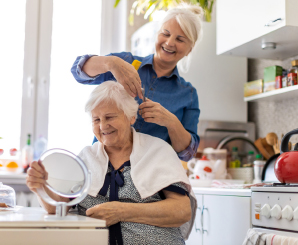Caring for an Older Adult with Dementia
Caring for someone with Dementia can provide special challenges. Follow these tips to help you when taking care of an older adult with Dementia
Dementia is a general term for loss of memory, thinking, and reasoning skills that are severe enough to interfere with daily life. A person affected by Dementia may have problems with language, memory, behavior, and emotions.
There are several different kinds of Dementia:
- Alzheimer’s disease
- Vascular dementia
- Dementia with Lewy bodies (DLB)
- Mixed dementia
- Parkinson’s disease
- Frontotemporal dementia
- Normal pressure hydrocephalus
- Creutzfeldt-Jakob disease
- Huntington’s disease
- Wernicke-Korsakoff Syndrome
Caring for an individual who has Dementia can have many challenges. Listed below are some tips on how to overcome the challenges or barriers that are associated with caring for someone with Dementia.
Source: clearcareonline.com
Communication
Communicating with someone who has Dementia can be one of the most challenging parts of their care. Because they may have difficulty with language, memory and emotions, they may have trouble expressing themselves and communicating clearly.
Use these tips when communicating with someone with Dementia:
Limit Distractions
Turn off the TV or radio or move to a quiet setting. Before speaking, make sure you have their attention. Identify yourself by name and relation, call them by their name, and maintain eye contact.
Be Patient
When waiting for a response, be patient with the senior and give them time. You can help prompt them with words if they are having trouble finding the right ones.
Ask Simple Questions
Ask close ended questions where a simple “yes” or “no” answer will suffice. Ask one question at a time and avoid giving too many options.
Be Affectionate
Respond with physical expressions such as holding hands, touching, hugging and praise to help keep them encouraged.
Give Step-by-Step Instructions
You can make tasks more manageable by breaking down directions into simple steps
Physical Health
Nutrition
Individuals with Dementia may forget to eat and drink, so their nutritional needs should be monitored closely. Here are some ways to help make sure they get the nutrition they need.
- Serve foods that are familiar to them.
- Offer snacks and small meals regularly.
- Set an alarm to remind them about mealtimes.
- Give them one course at a time so they aren’t overwhelmed by options.
- Serve food on plain dishes. Avoid dishes that have patterns.
- Some individuals may have difficulty chewing or swallowing. Serve them foods that are easy to swallow. Eat with them so they can see you chewing.
Hygiene
People with Dementia may have lost interest in maintaining their personal hygiene. Follow these tips to help them:
- Pay attention to the environment, such as water temperature and lighting and make it comfortable for the senior.
- Play calming music during bath time to help them relax.
- Give simple step-by-step instructions and be patient and encouraging.
- If they are calmer at certain parts of the day, use that time to perform their hygiene routine.
Aggression, Confusion and Agitation
Individuals with Dementia can often become angry, confused and agitated when they aren’t able to communicate clearly. Here are some ways caregivers can help when these situations arise.
Nutrition
If the person you care for becomes aggressive:
- Remove any items in the house that could be used to cause harm. You can put locks on cupboards containing knives and sharp objects.
- Try to see what triggers the aggression so you can prevent outbursts in the first place.
- Set an alarm to remind them about mealtimes.
- Give them one course at a time so they aren’t overwhelmed by options.
- Protect yourself. Plan safe places in the house that you can go to in case there is an outburst.
- Make sure that doctors and family members know about a senior’s aggressive behavior. Doctors can also give advice on how to handle aggressive behavior.
Confusion
If the person you care for becomes confused:
- Avoid making changes to their environment such as rearranging furniture or adding new items to the home.
- Put nightlights in hallways and bathrooms so they can find their way in the dark.
- Keep some large clocks and calendars throughout the house so they can reference the day and time.
- Post notes and reminders on bulletin boards as a way for them to know upcoming events or important reminders.
Agitation
If the person you care for becomes agitated:
- Reduce intake of foods that cause spikes in energy such as sugar and caffeine.
- Keep the same routine each day to avoid confusion. Keep photos and familiar objects throughout the house to offer a sense of security.
- Distract the senior with an activity or a snack. This can help them forget the incident.
- Use gentle music, touch, walking or reading to help stop agitation.




 Call:
Call: 












